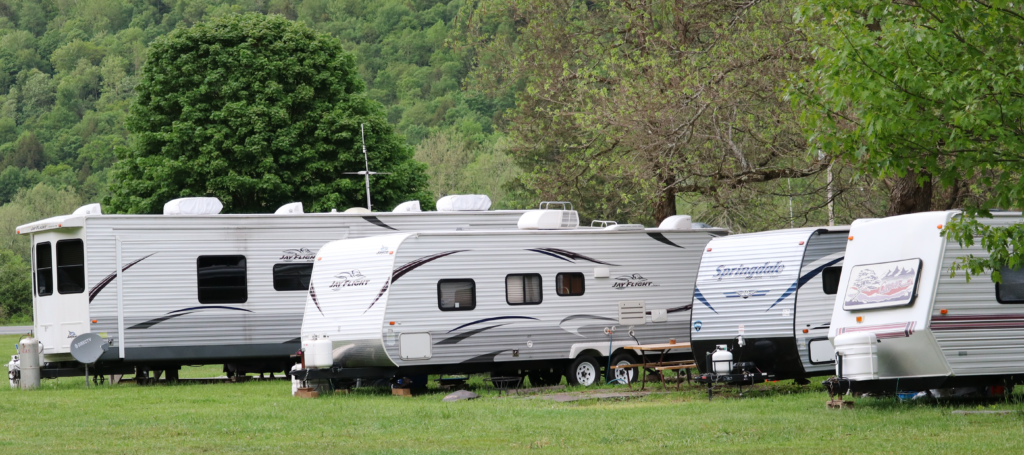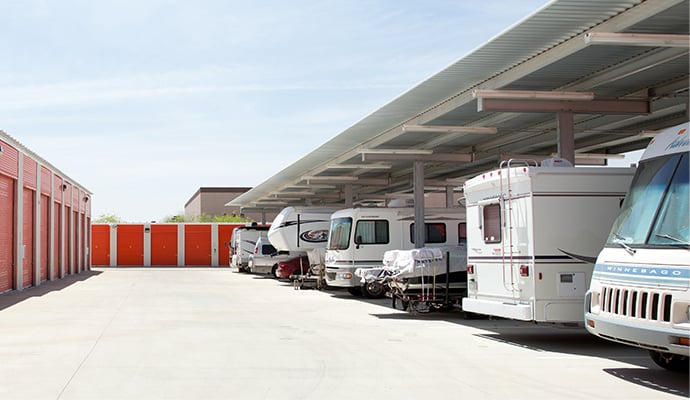
Where to Put Your Full-Time RV Home
Unless you are a full-time RVer, figuring out what to do with your RV when you aren’t using it can be a challenge. The larger the RV, the bigger the challenge. As we begin to drift nearer to the winter months, knowing where and how to store your RV starts to require more attention.
Depending on the climate you live in and how often you travel, you may end up paying storage fees for six months out of the year, or more. For some, that storage fee is on top of the monthly bank payment for the RV, and perhaps even insurance.
In this article, we’ll look at a better way to avoid or at least minimize your RV storage fees by discussing:
- Finding local RV storage
- Comparing covered storage with indoor rv storage
- Learn how much RV storage costs
- Storing your RV at home
- An alternative to RV storage and winterization
Is there RV storage near me?
First, you’ll want to get a handle on what the RV storage fees near you are. Obviously, Google will be tremendously helpful with this. Storage should be close enough so that you don’t blow off a potential camping trip because the RV is too far away every time you decide to use it. It should be close and convenient enough to go pick it up, bring it home, load it up and go on your adventure.
Covered RV storage vs indoor RV storage
Having covered RV storage is a huge benefit. Covered storage helps mitigate the UV damage incurred by being out in the sun. It also helps keep gunk off the roof and protects it from hail and falling tree limbs. With outdoor storage, you will probably still have to winterize, depending on the climate.
Indoor storage is offered two ways, indoor RV storage that is temperature-controlled, or not. They’ll be a definite cost difference between the two, and with uncontrolled RV storage, you may still need to winterize.
How much does RV storage cost?
The cost of RV storage seems to average between $10-$25 per foot, depending on whether you choose indoor or outdoor, and climate-controlled or not. Popular RV retailers National Indoor RV Centers offer temperature-controlled indoor storage. The rate fluctuates between $20-$25 per foot length of your RV, depending on whether you choose to bill monthly or annually. For a 40 foot RV, that can be $800 – $1000 a month, just for storage.
Outdoor storage, like what you might find at a U-haul facility, is significantly cheaper. That same 40 foot of RV storage might cost as little as $169 per month, is often gated, and usually has security cameras. Storage offered in a field or vacant lot, will cost even less, but you open yourself up to theft, weather damage, and rodent infiltration.

A home storage RV hack
Storing your RV at home is another option. Although you will be free from the monthly RV storage fees, there are many other issues to tackle. You must first deep dive into your local city ordinances and HOA agreements, if applicable. You should be absolutely certain you understand the rules and laws that pertain to you. Once you are certain you are allowed to store your RV on your property, you may have to apply for permits.
Next, you’ll need to make a myriad of decisions that are applicable to your type of RV.
- Do you need to install a 30/50 amp service?
- Will you need to pour a concrete slab?
- Can you cover the RV?
- Will the available spot be free from rodents and protected from the weather?
- Can you install a cover or building to house the RV?
All of these things must be decided, paid for, and made certain that they meet the letter of the law for your city or HOA. An uncovered concrete slab and a 50 amp service for a motorhome can run well north of $10,000 and may still require you to winterize the RV, depending on your climate.
Still, if your property is well protected and you have a great spot for your RV storage and easy access to electric service, storing your RV at home is a great option if you can pull it off.
An alternative to RV storage and winterization
Now that we have set the table for this great idea we’ll tell you what it is. Rent out your RV with Outdoorsy. I realize that initially, the thought of letting someone else get their hands on your baby is tough to stomach. But after another year or two of storage payments, winterization, and rodent or weather damage caused by storing your RV, suddenly the prospect of earning some great income on that RV instead of letting it just sit there is very attractive.
Like anything mechanical, RVs and the components therein function better when they are used more often. In addition to earning a substantial income, renting your travel trailer or motorhome keeps it running better.
The next time you are ready to take a trip, you won’t have to shake off the cobwebs and wonder if anything still works. You can just hit the road knowing full well it worked last week or last month.
Listing your RV with Outdoorsy is safe and insured
Consider these facts:
- RVing is the hottest vacation option on the planet right now and there aren’t enough to go around.
- Listing your RV with Outdoorsy is completely free.
- All renters are verified and must pass a thorough insurance check that will ensure that your RV is in great hands.
- You are fully protected! Outdoorsy’s $1 million liability insurance policy covers your RV or trailer whenever it’s being rented.
- As an RV owner, you set the pricing, availability, renter screening, and other conditions so that you only rent to RVers that meet your criteria. You decide if pets are allowed, smoking is prohibited, and any other conditions for your RV.
- 24/7 roadside assistance is automatically included.
- Outdoorsy provides 1-on-1 support & training to help you list your RV and start earning.
How much can I earn renting out my RV?
RV owners can look to make between $400-$1200 per week renting their RV with Outdoorsy. Rental prices for motorhomes are generally priced between $1000-$1,500/week while travel trailers run between $600-$800/week.
Outdoorsy will take a percentage of the fee that the renter pays. As the owner, you simply reap the profits and save on those RV storage fees while the RV is out being enjoyed.
Philip Westfall from Outdoorsy adds; “RV owners typically use their RVs for 4-6 weeks per year. The rest of the year, their rig sits at home or in storage facilities, which can get pretty pricey. By renting out their RVs on Outdoorsy, owners can make thousands of dollars per year with complete peace of mind.”
If my RV is damaged, then what?
Most people respect the property they are renting. RVs are well taken care of by renters and typically come back in the same, if not better, condition than when it goes out. In the extremely rare case that your RV is damaged during the rental, you are backed by Outdoorsy’s industry-leading insurance coverage. Your coverage during the rental includes:
- Complete liability coverage
- Collision and comprehensive
- Physical damage
- No deductible costs to you as an owner
I’m ready to give it a try, how do I get started?
Ready to start earning income on your RV? Want to enjoy it more? This is how to get started with Outdoorsy.
- List your RV with Outdoorsy
- Get access to the owner’s portal.
- Take some great pictures of your RV.
- Set the availability dates and list your RV.
- Wait for the money to roll in while you save on RV storage fees!

You are nuts… never would I loan/rent/whatever my RV to another person!!
mgg
I agree with you 100%. You would be crazy to rent your RV. I have too much time and money on mine to lend it out. I wouldn’t rent out my car, tools or other personal items either.
I pay $60.00 a month for a 30 foot class A, paved, secured gate, cameras and can go in most hours. It isn’t that expensive for storage.
Where is this? Looking for a place to store my 23 foot RV that’s not too pricey.
That last one…renting out your RV…
BIG MISTAKE!
Do not even consider it as a storage option…or any option, for that matter.
Note that even though your RV may have a 30 or 50 amp cord, you don’t need 30/50 service just for storage – you won’t be using that much electricity.
i stored my for years using a regular 15 amp plug to run the dehumidifier and keep the battery charged. i never tripped a breaker anywhere.
That’s exactly that I do H, mine is parked behind my house and even though I have a 30 amp connection that I use in the summer, in the winter I run a 15 amp extension cord and using a 50/15 amp adapter, I plug the cord in the house outside outlet. I run a dehumidifier and my battery stays up, I am also able to use the lights if need be to check or work on something in the trailer. I occasionally I put a battery charger on the battery to make sure it is at optimal charge, I am not trusting of the converter to do that job, but in the past years it has worked well.
I’m not renting out my 35 foot class A diesel pusher to someone who has likely never driven one. There’s a lot more to be aware of than your average class C. Driving in mountains, monitoring tire pressure, watching the gauges, etc. it’s not like driving a rental car.
We keep a lot of clothes and other stuff inside the coach as well as in the basement compartments. Yeah, they insure you, but if something happens, YOU lose access to your coach while it’s being repaired. If you have a loan on your RV, you might violate the terms of the loan. Same for YOUR RV insurance.
Do we have to leave all our stuff in the RV when renting or how much do we have to remove ahead of time.
@ Valerie, typically RV owners will leave anything that can improve the RV rental experience (dishes, linens, etc). The “paid add-ons” feature also helps you make additional income by renting out high valued items such as BBQs and electronics. Once you’ve completed your listing, a member from our Customer Success Team will reach out to answer any of your questions.
How does this work with a 5th Wheel. Do they come get it or do I have to take it to wherever they want it?
Be aware you’ll have to inform your insurance company that you rent it, and the cost will go up. Rent it without the rider, and if something does happen, you won’t be covered.
“Most people respect the property they are renting.”
LOL!
I’ve rented enough vehicles over the years to know better. RV’s are no different. In fact, many renters of RV are first timers who do not know about all the things that go along with RV’s and it’s equipment.
Renter beware.
We secured the storage (50 foot enclosed storage unit with power) five months before we purchased the coach.
I had a friend say he wanted to borrow my RV to go see some friends…..until I showed it to him. When he saw it was 45 feet long, almost 14 feet high, and 12 feet wide, he quickly changed his mind!!!
Need storage for my camper.
Here in St. Augustine FL the average lot fee is $160.00 per month.